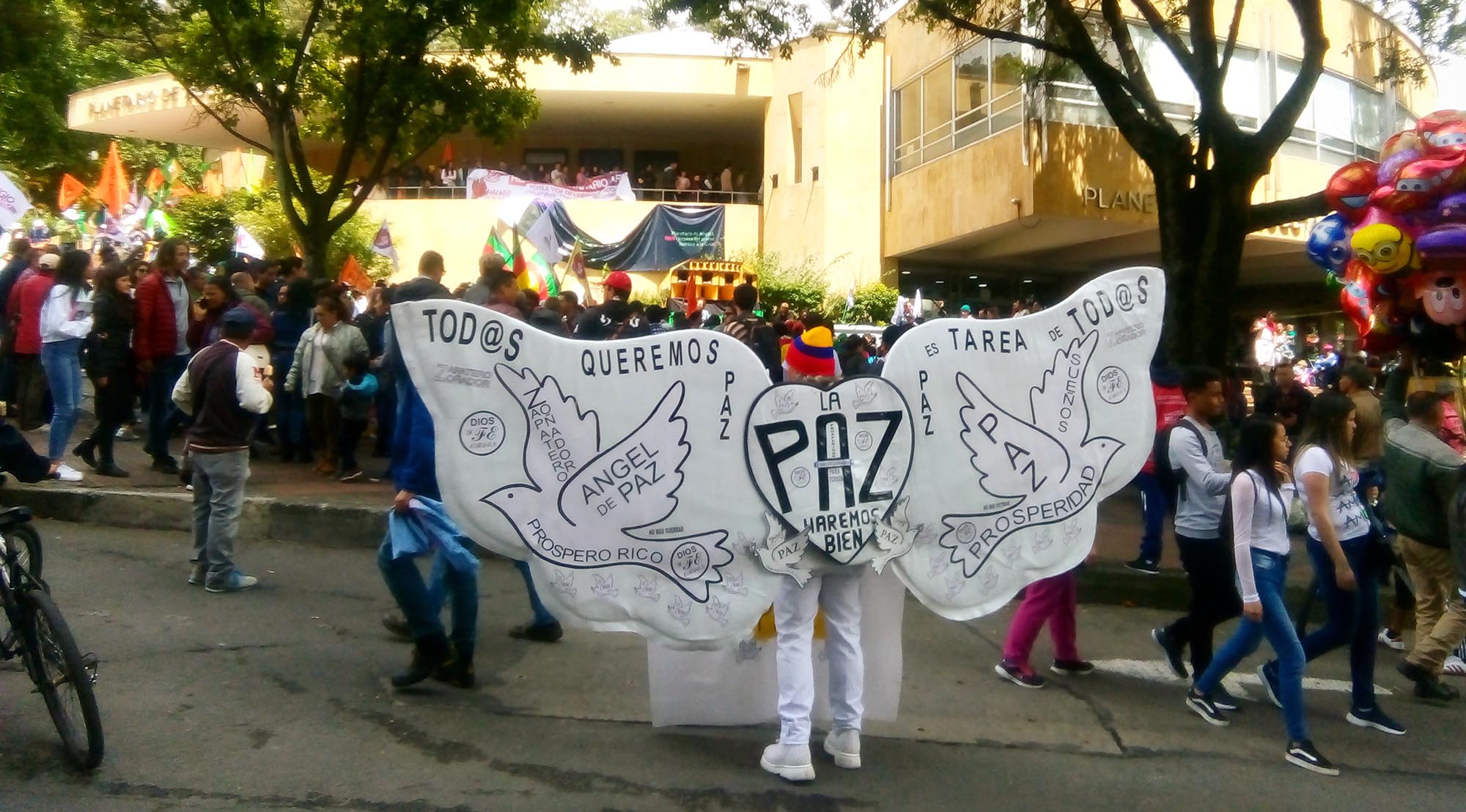Switzerland is overseeing the implementation of the peace agreement between the former FARC-EP (Fuerzas Armadas Revolucionarias de Colombia – Ejército del Pueblo) guerrilla group and the Colombian government. The peace agreement now stands on the brink of collapse. Switzerland and civil society find themselves facing new challenges.
Five years on since the signing of the peace agreement and a mere fraction of the objectives have been achieved, while prominent supporters of the FARC-EP are once again reaching for their weapons. Although close to 13,000 fighters were originally demobilized, estimates suggest that the dissident re-armed groups have doubled in strength over the course of the past year, expanding their ranks to around 5,000 members, and this trend shows no sign of stopping. In August 2019, former FARC-EP leader Iván Márquez and the member of parliament for the newly established Comunes party, together with around twenty other senior party members, announced they were going to take up arms once again. The announcement came as no surprise, as the failures to properly implement the agreement were clear to see. A distinct lack of progress had been made in regard to integral land reform and illegal drugs in particular. The Colombian government, led by Iván Duque, recently announced its plans to resume the use of glyphosate in the fight against coca production. Herbicide use is opposed by both environmental organizations and farmers’ associations as well as the UN. The peace agreement provides for the voluntary substitution of coca plants with alternative crops, however, the financial assistance that was promised failed to materialize in many areas. The safety of the former guerrilla fighters also continues to be compromised. Nearly 280 former guerrilla combatants have been killed since the peace agreement was signed in 2016. Ruiz Massieu, Head of the UN Mission in Colombia, criticizes the insufficient level of protection: “There are still too many threats and too many deaths. Any other developments will be irrelevant as long as the safety of the ex-combatants cannot be guaranteed.”
Complex conflict dynamic
Defenders of human rights are also being killed at a rate that has not been seen for many years. Yet it is not merely the group surrounding Iván Márquez that poses a threat. Other armed groups are also taking advantage of the situation in order to expand their territorial and social control. The ELN (Ejército de Liberación Nacional) guerrilla group, dissident groups belonging to the FARC-EP, and neoparamilitary groups are filling the power vacuum left behind by the former FARC-EP and left open by the government’s failure to address it. Rather than peace being restored, the conflict has merely transformed. From what was once a conflict fought on just one or two fronts, an unfathomably complex and continually evolving dynamic between a wide variety of opposing groups has emerged, thereby putting long-term, sustainable peace out of the question. This development means that the threats now faced by human rights defenders have become more diverse in nature, making it even more difficult to ensure their protection.
The looming collapse of long-sought peace is undoubtedly also linked to the inadequate involvement of other key actors in Colombian society in the peace negotiations, such as victims of the armed conflict, women, young adults, children, indigenous peoples, and small-scale farmers. Furthermore, the country’s current government, under the leadership of Iván Duque, lacks the political will to implement the peace agreement.
Challenges for Switzerland
Despite the difficult circumstances, Switzerland, in its official capacity, remains committed to the peace process in Colombia and is supporting preventive measures designed to protect the population from armed violence. More specifically, Switzerland is supporting projects in the areas of political participation, observance of human rights, dealing with the past, removal of anti-personnel mines, and humanitarian aid. Additionally, it is assisting with the restitution of land to small-scale farmers who have been displaced due to the conflict. The situation faced by those affected by these issues has deteriorated in recent years. Violence perpetrated against leaders of social movements has increased, illegal armed actors continue to rely on land mines, violations of human rights are commonplace, as demonstrated by the ongoing social protests in Colombia, and the process for the restitution of land is proceeding at a snail’s pace. Since last year there has also been a shocking increase in the number of massacres. It was mistakenly assumed that, under the peace agreement, tragedies like this would become a thing of the past. Switzerland’s efforts as mediator in negotiations between the Colombian government and the ELN guerrilla group have been highly limited in their success. An imminent resolution is still a long way off following the Colombian government’s demand for the extradition of the ELN delegation to the most recent negotiations in 2019, which has remained in Cuba since that time.
Civil society divided
There are also challenges for civil society, in which frustration with the slow implementation of the peace agreement is growing. Those involved in the current anti-government protests are therefore constantly demanding its implementation, among other things. Although some of Colombia’s non-governmental organizations continue to adhere to the agreement, submit reports on human rights violations to the transitional justice system, and support the Truth Commission, others have become resigned and are directing their resources toward their own independent projects. International civil society continues to stand behind the peace agreement, but is becoming increasingly concerned by the deficiencies in its implementation.
Remaining under the watchful gaze of international observers is crucial for defenders of human rights in particular, as this enables them to continue their work in safety. In view of the numerous challenges, it is therefore all the more important that Switzerland and civil society remain firmly committed to their efforts in Colombia, thereby contributing to lasting and sustainable peace in the country.


